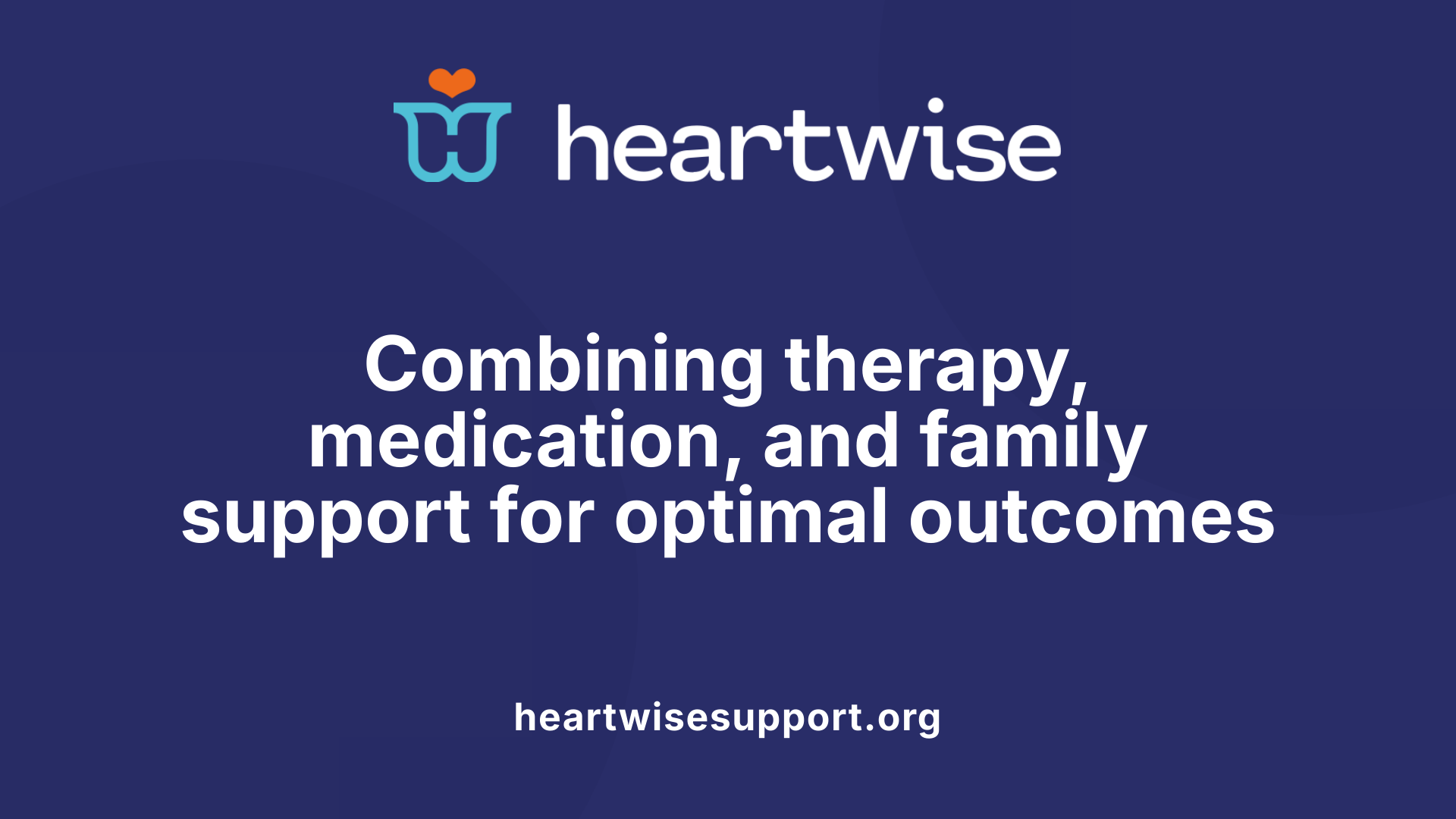Understanding Depression in Children with Autism
Depression is a prevalent mental health concern among children with autism spectrum disorder (ASD), significantly impacting their quality of life. Research indicates that individuals with autism are four times more likely to experience depression than their neurotypical peers. Symptoms can manifest as persistent sadness, social withdrawal, irritability, changes in sleep, appetite, and self-harm behaviors. Diagnosing depression in children with ASD presents unique challenges due to overlapping behaviors and communication difficulties. Early identification, tailored assessment tools, and a holistic understanding of each child's baseline behavior are crucial for effective intervention.
Effective Treatment Approaches for Depression in Autistic Children

What are the effective treatment options for depression in children with autism?
Treating depression in children with autism requires a comprehensive, individualized approach that combines multiple strategies. Because autism spectrum disorder (ASD) presents unique challenges, treatments often need to be adapted to meet each child's specific needs.
Psychosocial interventions are a primary component of treatment. Modified cognitive-behavioral therapy (CBT) is frequently recommended, with adjustments like using concrete language, visual aids, and incorporating a child's special interests to improve engagement and understanding. These adaptations help children recognize and challenge negative thought patterns, manage anxieties, and develop emotional regulation skills.
Social skills training programs such as PEERS® have shown promise in some studies. These programs focus on improving social interactions and relationships, which can reduce feelings of social isolation that often contribute to depression.
Mindfulness-based therapies are also being explored for their potential benefits. Evidence suggests that adapted mindfulness approaches may help reduce symptoms of depression and anxiety in autistic adults, and preliminary results are encouraging for children as well. However, more rigorous research is necessary to establish best practices.
Medication management includes the cautious use of antidepressants like selective serotonin reuptake inhibitors (SSRIs). They can be helpful in managing symptoms, but children with autism may experience increased side effects such as irritability or sleep disturbances. Close monitoring by healthcare providers is essential.
Family involvement is crucial throughout treatment. Educating caregivers about the child's condition and involving them in therapy plans enhances treatment adherence and effectiveness. Family-based interventions help address potential environmental and familial factors that influence mental health.
Overall, combining behavioral therapies, supportive medication management, and active family participation creates the best foundation for reducing depressive symptoms in children with autism. Continuous assessment and flexibility in adjusting treatment strategies are vital to accommodate the child's evolving needs.
In summary, effective treatment combines adapted psychosocial therapies like CBT and social skills training, cautious medication use, and strong family support. As research advances, more specific and evidence-based guidelines are expected to further improve outcomes for autistic children experiencing depression.
Evidence-Based Mental Health Therapies for Autism-Related Depression

What evidence-based mental health therapies are recommended for depression in autistic children?
Managing depression in children with autism involves several therapeutic strategies that have demonstrated effectiveness or show promising results. One of the primary approaches is modified cognitive-behavioral therapy (CBT). Traditional CBT techniques are adapted to meet the learning and communication styles of autistic children by incorporating concrete language, visual supports, and activities aligned with the child's interests. Such modifications help children better understand and apply coping skills, reducing depressive symptoms.
Emerging evidence suggests that mindfulness-based interventions (MBI) can be beneficial, especially for autistic adults. These therapies typically focus on improving awareness of bodily sensations and emotional states, fostering self-regulation, and reducing anxiety and depression. However, research specifically targeting depression in young children with autism remains limited, and further studies are needed to confirm their efficacy in this age group.
Psychosocial interventions, including social skills training, family therapy, and structured, visual, and predictable sessions, also play an important role in supporting mental health. These programs often involve parents actively and are designed to improve peer interactions, emotional understanding, and social functionality.
While pharmacological options such as selective serotonin reuptake inhibitors (SSRIs) are sometimes prescribed to manage depression symptoms, they are used cautiously due to potential side effects like behavioral activation and sleep disturbances. Medications are not officially approved specifically for depression in ASD, and their use should be closely monitored.
Given current evidence, a comprehensive, individualized approach that combines psychosocial therapies and, when appropriate, medication is recommended. Tailoring interventions to the child's unique needs and strengths enhances the likelihood of successful management of depression in autistic children.
Adapting Mental Health Treatments for Autistic Children

How can mental health treatments be adapted to better meet the needs of children with autism and depression?
Children with autism often face unique challenges in mental health treatment due to differences in communication, sensory processing, and learning styles. To improve outcomes, therapeutic approaches should be highly personalized.
Incorporating visual aids, concrete activities, and routines makes therapy more accessible and effective. For example, using pictures, social stories, or hands-on activities can help children understand and engage with therapy concepts.
Therapists need specialized training in autism-specific strategies. This includes understanding sensory sensitivities, preferences for routine, and how to incorporate a child's special interests into sessions. Such training boosts therapist confidence and allows them to deliver more effective, engaging care.
Adapting evidence-based therapies like cognitive-behavioral therapy (CBT) involves tailoring activities with clear guidance, visual supports, and sensitivity to sensory issues. Family involvement is also crucial, as it helps reinforce strategies at home and in other settings.
Group interventions, such as autism-adapted CBT programs, can be beneficial for social skills and peer support. Community involvement and neurodiversity-affirming practices create welcoming environments that respect individual differences.
Overall, flexible, accessible environments—augmented with ongoing research and tailored assessment tools—are vital. These adaptations help children with autism better understand, participate in, and benefit from mental health care, ultimately leading to improved emotional well-being and resilience.
Diagnosis and Recognition of Depression in Children with Autism
What factors should be considered when diagnosing depression in children with autism?
Diagnosing depression in children with autism can be complex due to overlapping symptoms and communication barriers. Clinicians need to be vigilant for behavioral changes that are atypical or persistent, such as increased irritability, social withdrawal, agitation, or a decline in self-care habits.
Since children with autism may struggle to communicate their feelings, observing behavioral indicators becomes crucial. Sleep disturbances, appetite changes, and mood swings that are new or more severe than usual can signal depression.
It's important to understand each child's baseline behavior, as autism-related behaviors like stimming or repetitive actions might mask or mimic mood symptoms. The use of validated screening questionnaires tailored for ASD—such as the PROMIS Autism Battery or Parent-Rated Anxiety Scale for ASD—can assist in systematic assessment.
Additional assessment should include detailed interviews with caregivers to gather information on recent environmental stressors, family dynamics, and any significant transitions. Recognizing risk factors like a family history of depression or recent life changes can prompt closer monitoring.
Ultimately, a holistic approach that combines behavioral observations, caregiver reports, and appropriate screening tools is essential to accurately identify depression in children on the autism spectrum.
Support Resources and Guidance for Families
Managing depression in children with autism can be challenging, but families have access to various support resources and guidance to help navigate this process. Reputable organizations such as Autism Speaks, Autism Society of America, and local centers like the Autism Resource Center and the Center for Autism and Related Disorders (CARD) offer valuable educational materials, family support groups, and training programs.
These organizations provide connections to mental health professionals, tailored therapy services, and caregiver education that focus on addressing depression within the context of autism. Support groups—whether in person or online—create community connections and sharing opportunities, which can be beneficial for emotional support and practical advice.
Online resources and virtual workshops have become increasingly available, offering flexible options for learning about managing depression and autism. These platforms often feature webinars, interactive sessions, and informational content designed to help families develop effective support strategies.
Navigating mental health services requires collaboration with qualified healthcare providers familiar with autism. Developing personalized plans that include therapy, social skills training, and family counseling can greatly improve outcomes. It is also recommended that families leverage local and national networks for comprehensive support.
In summary, utilizing a combination of educational resources, community connections, professional guidance, and online tools provides families with the essential support needed for managing depression in children with autism, fostering resilience, and enhancing quality of life for both children and their caregivers.
Role of Family and Caregiver Support in Managing Depression

How can family-based interventions support children with autism and depression?
Family-based interventions are a cornerstone in supporting children with autism who are experiencing depression. These approaches often include family therapy and counseling, which help improve communication within the household, foster emotional understanding, and develop effective coping strategies.
Involving parents and other caregivers is especially important because family dynamics can significantly influence the mental health of children with autism. When parental stress, depression, or relationship issues are addressed through support and therapy, there tends to be a positive impact on the child's emotional well-being.
Creating a supportive home environment also plays a vital role in reducing depressive symptoms. Consistent routines, sensory-friendly spaces, and opportunities for social connection can help children feel more secure and less overwhelmed.
Engaging families in mental health treatments provides them with tools to better support their child’s emotional regulation and social skills. It also empowers them to advocate effectively within educational and community settings. Overall, strengthening family relationships and ensuring a nurturing environment can significantly improve treatment outcomes for children with autism experiencing depression.
Research Gaps and Future Directions in Treating Depression in Autism
What research gaps exist regarding treatment of depression in children with autism?
Research into managing depression within the autism spectrum remains limited and evolving. As of 2020, no universally accepted treatment standard has been identified. Most existing studies are characterized by moderate to high risks of bias, often lacking rigorous designs such as randomized controlled trials. This scarcity of high-quality evidence hampers definitive conclusions about the effectiveness of therapies and medications.
Psychological interventions, including cognitive-behavioral therapy (CBT) and mindfulness-based approaches, show potential in alleviating depressive symptoms, yet they require further validation through larger, well-structured studies. Moreover, there's a significant knowledge gap concerning the safety and efficacy of pharmacological treatments, especially for children and adolescents. Specifically, research on long-term outcomes, optimal treatment combinations, and individual predictors of response is sparse.
Future investigations should focus on developing autism-adapted therapies that account for communication and cognitive differences. Identifying biological markers or predictors that signal a favorable response to specific treatments could personalize care. Additionally, understanding the interaction of depression treatments with the unique neurodevelopmental characteristics of autism will be essential.
Addressing these gaps will pave the way for more precise, evidence-based interventions. This effort requires collaborative research efforts, increased funding, and inclusion of diverse autistic populations to ensure treatments are safe, effective, and tailored to individual needs.
Towards Better Support and Outcomes
While current treatment options for depression in children with autism encompass behavioral therapies, medication, and family support, the evidence base remains limited, emphasizing the pressing need for further research. Tailoring interventions to meet individual needs, enhancing early diagnosis, and increasing access to specialized mental health services are essential steps forward. Promoting awareness, training clinicians in autism-sensitive approaches, and supporting families through community resources can substantially improve outcomes. As research progresses, integrating emerging evidence-based strategies with personalized care will be key to alleviating depression and enhancing the well-being of autistic children.
References
- Treatment of Depression in Individuals with Autism Spectrum Disorder
- The Art and Science of Treating Depression in Autism
- Tips for Managing Mental Health Disorders in Children with Autism
- Treatment and Intervention for Autism Spectrum Disorder - CDC
- Depression - National Autistic Society
- Mental Health in the Autism Community - Autism Society of NC
- Common mental health therapies and treatment for autistic people











